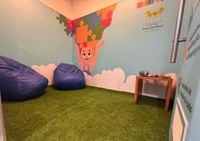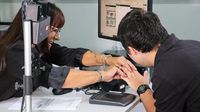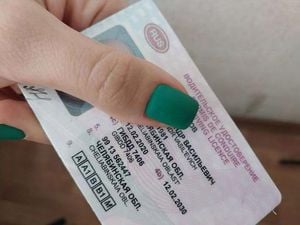On April 2, 2025, the world recognized Autism Awareness Day, and several initiatives across Brazil marked the occasion with significant advancements for neurodivergent individuals. From the inauguration of specialized spaces to the introduction of essential identification services, these efforts aim to foster inclusivity and support for those on the autism spectrum.
In Porto Alegre, the Instituto-Geral de Perícias (IGP) inaugurated the Sala Girassol, a dedicated environment designed to assist neuroatypical individuals during the identity card issuance process. This space, located at Avenida Azenha, 255, within the Departamento de Identificação, is the first of its kind in Rio Grande do Sul and one of the pioneering facilities in Brazil aimed at providing specialized services for neurodivergent people.
Marco Antônio Aurélio Cúrcio, the deputy director-general of the IGP, emphasized the collaborative effort that brought this project to fruition. "The creation of this room was only possible thanks to the joint efforts of staff and partners who understood the importance of this advancement. I want to thank everyone involved in this project, as we know that real changes occur when we join forces," he stated.
The Sala Girassol is tailored to meet the needs of individuals with various cognitive and neurological differences, including autism, Down syndrome, ADHD, and Tourette syndrome. Conventional environments can pose challenges for these individuals, often leading to discomfort and stress due to excessive noise and movement. The Sala Girassol aims to provide a welcoming atmosphere equipped with toys and qualified attendants, ensuring a more tranquil experience for both the individuals and their parents when obtaining essential identification services.
To schedule an appointment for identity card issuance at the Sala Girassol, individuals must visit the IGP's website. Required documents include a CPF, an original certificate, and a medical report. Additionally, minors under 16 must be accompanied by a legal guardian with photo identification, which can include parents, grandparents, or legal guardians.
Meanwhile, in the metropolitan region of São Paulo, the Shopping Praça da Moça celebrated the opening of the Sala Azul, or Blue Room, also on April 2. This space is dedicated to accommodating children with Autism Spectrum Disorder (ASD) and was affectionately dubbed the "sala do afeto" or affection room. Located within the clinic area of the shopping center, the Sala Azul aims to provide a safe and calm environment for children experiencing crises.
Renata Paes, the general manager of Shopping Praça da Moça, highlighted the importance of this new facility. "The inauguration of the Sala Azul reinforces our commitment to the well-being and comfort of families visiting the shopping center. We have thoughtfully considered every detail to provide a secure and welcoming environment," she remarked.
The Sala Azul is equipped with sensory toys and comfortable seating, designed to offer appropriate stimuli for children in need of comfort. The shopping center also provides special tables for preferential use in the food court and exclusive parking spaces for visitors with ASD and their companions.
In another significant development, the Government of São Paulo, through the Secretary of State for the Rights of Persons with Disabilities (SEDPcD), partnered with ViaMobilidade to inaugurate a sensory room for autistic and neurodivergent individuals at the Santa Cruz station on Metro Line 5-Lilás. This facility, also opened on April 2, was designed by architect Ana Paula Chacur and features sound insulation, adjustable lighting, and individual seating designed to create a safe and comfortable environment for sensory regulation.
Marcos da Costa, the Secretary of State for the Rights of Persons with Disabilities, stated, "Our commitment is to make São Paulo increasingly accessible and inclusive. The inauguration of this sensory room represents a significant advancement in making public transportation more welcoming for autistic and neurodivergent individuals."
The Santa Cruz station, which serves approximately 3,000 people with disabilities monthly, also features a Disability Information Center. This center offers in-person and online assistance, addressing inquiries and providing minor repairs for wheelchairs and canes. Other accessibility solutions at the station include tactile floors, elevators, ramps, preferred seating, and adapted restrooms. Similar sensory rooms are already operational at other stations, including Pinheiros, Tatuapé, and Barra Funda.
In Três Lagoas, Mayor Dr. Cassiano Maia visited the Escola Municipal Profª "Maria Eulalia Vieira" to unveil a sensory room project created by the Grupo "Office³" architecture firm. This room is intended to support the emotional and sensory regulation of the 32 autistic students attending the school. During the visit, Dr. Maia expressed gratitude for the opportunity to enhance the educational environment for these children.
Additionally, the mayor visited the Central de Interpretação de Libras (CIL) and the Programa de Erradicação do Trabalho Infantil (PETI) to inform the public about the issuance of identification cards for individuals with Autism Spectrum Disorder (CIPTEA). These cards facilitate access to public and private services, particularly in health, education, and social assistance. To obtain the card, individuals can schedule an appointment via WhatsApp and must provide specific documentation, including an RG or birth certificate, CPF, proof of residence, medical report, and a photo.
These collective efforts across various regions of Brazil highlight a growing awareness and commitment to supporting individuals with autism and other neurodivergent conditions. By creating specialized environments and services, these initiatives aim to foster inclusivity, ensuring that individuals can access essential services with greater ease and comfort.






